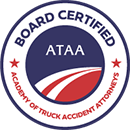Cement Mixer Accidents
Passenger car drivers often feel a bit uncomfortable when sharing the road with any size commercial truck, and a cement or concrete mixer is top up on that list. While there are certain risks associated with driving alongside any vehicle, a cement mixer truck is uniquely designed and operates differently than others, making it more dangerous than the rest.
Below, our experienced cement mixer accident lawyers at Trucking Injury Law Group highlight the negligence that often results in concrete mixer truck accidents and the types of crashes that more commonly occur than others. We wrap up this information by sharing what your options are if you’ve been involved in a cement mixer truck accident and why seeking financial compensation often necessitates hiring an experienced lawyer to forward your claim.
A cement truck accident lawyer on our Super Team at our nationwide law group would be happy to discuss the details surrounding your wreck to see if you have a valid claim. Contact us for a free initial consultation so we can get started working for you right away if we deem you to have a viable case.
Accident Types Cement Trucks Become Involved In
Concrete mixer trucks or ones that carry cement are more likely to become involved in certain crashes than others. Some of the more commonly occurring ones are:
- Rollover accidents: Cement trucks tend to sit up higher or have a high center of gravity. They also have a more significant concentration of weight in one area, both of which are factors that leave these commercial vehicles more apt to have a rollover crash if a trucker takes a turn too fast, for example.
- Blind-spot accidents: Concrete trucks have typical blind spots like other similarly sized automobiles, plus a few extras, such as the mixer drum itself and the frame that holds it in place, making it necessary for truckers to be extra cautious and check for other vehicles or pedestrians when navigating turns, changing lanes, merging, and otherwise venturing into a potential active line of traffic to avoid causing a crash.
- Backing-up accidents: Cement truck operators must often back up to a precise spot to drop their load. Taking time to get out of their trucks to inspect the area for potential hazards and to warn workers and anyone else in the area that they’ll soon be putting the truck in reverse and to move out of the way is important. Taking those measures doesn’t get them out of needing to continue checking their blind spots once they put their cement mixer in reverse to ensure it remains clear of people and property, though.
- Sideswipe accidents: Truckers driving too quickly along narrow roads can lead to the side of a vehicle being scraped or sheared off, or “dooring” types of accidents. Cement truck drivers may cause these accidents to happen by attempting to navigate tight spaces instead of taking alternate routes, not only leaving behind property damage but causing accident injuries if someone is struck.
Reasons Cement Truck Accidents Happen
While there are some commonalities among many types of truck accidents, there are some factors that are unique to cement mixers too that may result in crashes, such as:
Unequal Weight Distribution
Cement mixer trucks are unique in that there’s the weight of the actual truck, then there’s a drum that houses a particularly heavy load—the cement. While there’s a weight limit that a load may max out at when the mixer is fully loaded with concrete, how much the truck weighs can vary depending on whether the drum is fully or partially loaded or nothing is in it at all.
The weight of the mixer itself or shifting loads can easily cause these cement trucks to have rollovers if its operator isn’t trained at skillfully avoiding having such a crash. Rollover accidents wouldn’t just put the trucker at risk of getting hurt but also any motorists, including motorcyclists, nearby.
Cement Mixer Drivers’ Inexperience
A concrete mixer truck is different from other large trucks in that it often sits higher off the ground than other commercial trucks. Cement mixers take special skill to operate, both in terms of driving them and using the mixer and associated chute for dispersals. A relatively new trucker may not be experienced enough with different aspects of their vehicle’s operation, which can cause them to easily lose control of their truck, sideswipe passenger vehicles if they fail to check their blind spots, and become involved in what would otherwise be a preventable cement truck crash.
Truckers Drive Faster Than the Posted Speed Limit
One detail unique to cement mixer and concrete trucks is that the substance contained within them can harden within two hours of being mixed—even despite the fact that its contents are constantly being moved while idle and in transit. This detail often forces cement truck operators to speed along more quickly on the road than others.
The problem is that a heavier truck, like one filled with heavy cement, may take more time to come to a full stop when the brakes are applied compared to a lighter one traveling at the same rate of speed. An accident can occur as a result, which can lead to wet cement spilling out, creating a mess to clean up and a roadway hazard situation that could cause further crashes.
Poor Maintenance
Any tractor-trailer or large truck roaming our roads needs to be maintained in tip-top condition, especially when it’s being subjected to the demands of a cement mixer. Since a trucking company generally owns these commercial vehicles, it’s not uncommon for a truck accident attorney to seek compensation from the companies that failed to maintain their fleet if poor mechanics is deemed to have contributed to the crash.
Determining Who’s Responsible for a Cement Truck Accident
The terms responsible and liable are often used interchangeably when describing the at-fault party in a crash. When it comes to determining liability for an accident, a cement mixer accident lawyer must generally be able to prove four elements, including:
- The cement truck driver had a duty of care to safely drive their vehicle
- The trucker breached their duty of care
- The cement truck crash directly caused your injuries
- You sustained documentable damages because of your involvement in the crash
Evidence Used To Establish Fault in a Cement Mixer Truck Accident Case
Some pieces of evidence can come in handy when a truck accident attorney attempts to prove almost any commercial vehicle crash case, such as:
- A police report made for the cement truck accident
- Trucking company personnel records
- Motor vehicle safety reports showing whether a trucker tends to drive safely or has a record of past driver error issues
- Witness accounts, such as from construction company workers who were there at the scene when someone sustained severe injuries or drivers of other vehicles who saw the mixer truck accident occur
- Electronic logging device (ELD) and event data recorder (EDR) data, which may shed light on what happened leading up to the accident, including perhaps whether the truck driver worked long hours before the incident occurred
- Surveillance camera footage from homes or nearby businesses that may have captured what happened in the moments leading up to the accident
It’s important to note that when injuries happen in workplaces, like construction sites, for example, employers are often required to not only document those injuries in a report but also to notify the state’s Occupational Health and Safety Administration (OSHA) office as well. Documents filed may come in handy to any of our cement truck accident lawyers at Trucking Injury Law Group as we attempt to build cases and file them with the insurance company of any negligent drivers, trucking companies, or any other liable parties.
Work With an Attorney When Filing A Cement Mixer Accident Claim
While it can happen in any accident case, the chances of insurers representing cement truck drivers contesting liability are high. This fact can make it hard to recover the maximum compensation needed to cover current and future medical expenses you have because you suffered serious injuries. This may lead to your medical bills going to collections if you missed work and aren’t able to secure a fair settlement for your lost wages either.
And, should you have more permanent injuries, you’re likely to have future medical expenses and to have more lost earnings. Insurance companies tend to do everything possible to deny liability in these cases as they know just how costly they can get for them to settle.
The scenarios described above should make it clear why you should entrust your mixer truck accident case to a legal team that has extensive experience in handling these claims. Here at Trucking Injury Law Group, we only handle truck accident cases, which gives us an upper edge on how these legal matters unfold. Contact us to schedule a risk-free consultation to learn more about our services so we can get to work for you.






